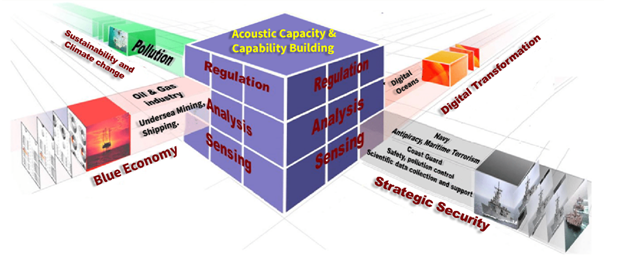In the contemporary global landscape, there is a growing recognition of the crucial role played by the underwater sphere and freshwater systems in driving economic expansion and maintaining climate equilibrium. These aquatic domains, particularly the underwater commons, have emerged as vital trade routes facilitating nearly 90% of global trade. The imperative for sustainable and efficient transportation infrastructure to support these routes is now at the forefront of international priorities. Furthermore, the untapped potential of deep-sea resources, spanning both biological and non-biological elements, demands focused exploration due to their substantial economic and strategic significance. Addressing global challenges such as food and energy security is increasingly linked to the responsible utilization of oceanic and freshwater resources. However, the pursuit of access and control over these resources may also raise concerns about potential competition and conflicts among coastal nations.
The heightened awareness of the strategic importance of underwater security has led to an increased naval presence in the underwater commons. Simultaneously, freshwater systems hold comparable significance, necessitating effective governance mechanisms built on a foundation of comprehensive situational awareness.The Underwater Domain Awareness (UDA) emerges as a crucial framework for advancing our understanding and application of knowledge in this context. UDA encompasses four pivotal domains: underwater security, the blue economy, environmental and disaster management, and science and technology.
Recent geopolitical dynamics have witnessed strategic shifts towards the tropical coastal waters of the Indo-Pacific region, with non-regional powers positioning themselves strategically. This includes deploying military assets and research vessels to establish effective UDA. The Indian Ocean Region (IOR) is particularly susceptible due to its unique socio-political and socio-economic characteristics. Security concerns related to underwater terrorism and piracy are pervasive, with non-state actors operating in cooperation with local governments. Extra-regional powers deeply influence the region's domestic politics, potentially manipulating governance mechanisms as needed. The existing regional underwater framework demonstrates limited coherence with long-term national interests, posing challenges despite the IOR's high population density and rapidly growing population.

The Underwater Domain Awareness (UDA) Framework, presents a novel and comprehensive approach that combines policy and technological interventions with the enhancement of acoustic capabilities and capacity. What distinguishes this framework is its role as a unifying platform, bringing together stakeholders involved in strategic security, the blue economy, sustainability, climate change management, and digital transformation. In the complex democracy of India, where concerns about the fragmentation of stakeholders often arise, this collaborative approach encourages synergy among stakeholders. The structural framework of UDA holds the potential to facilitate a seamless transformation in governance processes, enhancing transparency and accountability. Most notably, the UDA framework is poised to effectively address the myriad challenges and opportunities presented by the unique tropical littoral waters within the ever-evolving geopolitical and geostrategic realities of the region.
Coordinator:
Smt. J. Cathrine, MRC


